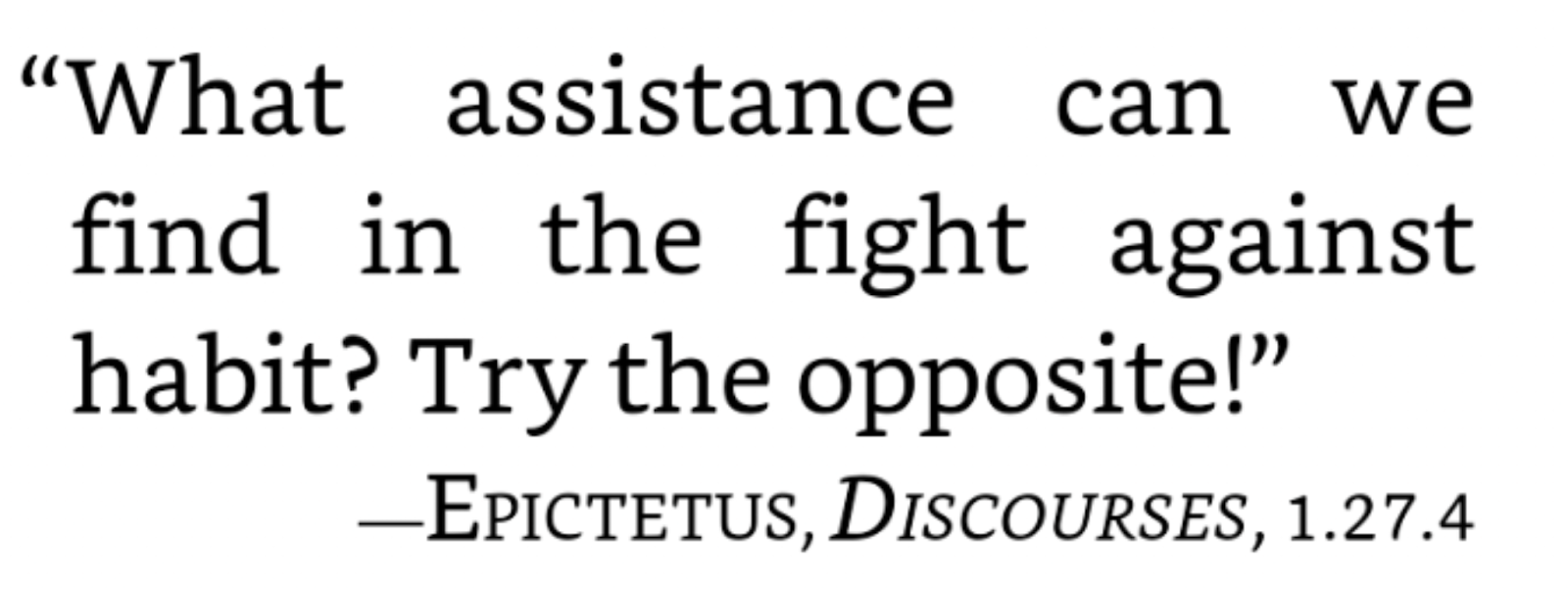210626 What I learned in my studies this morning
Fasting days on end
Chapter 21: Stoicism Reconsidered
Feels better than you might think.
Resets my body.
Daily Stoic:
Paradoxical intention, Viktor Frankl's phrase for it, is what Epictetus is suggesting here: to keep your mind from excessively focusing on the bad thing you want to avoid, instead you concentrate on the opposite.
Daily Stoic:
Paradoxical intention, Viktor Frankl's phrase for it, is what Epictetus is suggesting here: to keep your mind from excessively focusing on the bad thing you want to avoid, instead you concentrate on the opposite.
My bad habits are a lengthy list — I'm sure I could list a few dozen without too much effort — and it gets longer each year. Too much TV or staying up too late. Too many distractions at work or too much bad food at meals.
On that last one, following Epictetus' advice has been working well. I fast as part of my efforts to lose weight. For the past two months, I've been practicing 5 / 2 fasting: nothing during the week then refeeding during the weekends. My weight is down, my energy is up, my attitude is good, and I'm feeling great overall.
It's gotten easier as time goes by, but when I find myself struggling and wanting to break my fast, I focus on the opposite. Instead of thinking about how good that morsel would taste, I examine my current physical state. Yes, that chip or pizza looks good, but when I focus, I realize I actually feel great. My body is functioning fine and I know that breaking my fast will only make me feel worse, regardless of the temporary pleasure the taste treat may bring.
By doing the opposite, by thinking about the negative medium-term effects of eating that cookie instead of the momentary sweetness, I can stop the cravings and reenter my attention on the bigger picture: health and well-being.
From A Guide to the Good Life by William B. Irvine:
Chapter 21: Stoicism Reconsidered
Over the millennia since humanity arose, we have developed certain mental tendencies that improved our chances of survival and reproduction.
Irvine considers three of these inherent propensities: pain at loss of social status, insatiablility of desires, and anxiety.
All have obvious advantages for our primative ancestors. Pain at loss of social prominence would drive us to pursue higher status, gaining more reproductive opportunities as we gained reputation. Insatiablility of desires would improve our hoard of resources as we grabbed all we could when important items became available. Anxiety, worrying about that sound in the bushes or where our next meal would come from, protected us from circumstances which might cause premature death.
As civilization has advanced, these threats to our survival and ability to reproduce have diminished significantly. Unfortunately, our mental habits remain firmly fixed in prehistoric times.
The Stoics goal in life is happiness brought on by serenity. This shift of focus from survival to satisfaction allows us to concentrate our efforts on Stoic techniques practices which effectively limit the harm overactive evolutionary responses can produce.
We can choose to ignore social slights and overcome the illusory harm our minds attach to them. We can choose to be satisfied with what we have, instead of wasting time, effort, and resources buying ever more, or ever more expensive, items to fill our homes. We can choose to release the anxiety which prevents action or which paralyzes our decision making.
Things which were an advantage when our primary goal was survival are a disadvantage when we seek fulfillment and tranquility. Let us use our reason to change that.






Comments
Post a Comment
Please note that I am not saying I agree or disagree with what is posted above. It is merely a recording of what I read this morning.